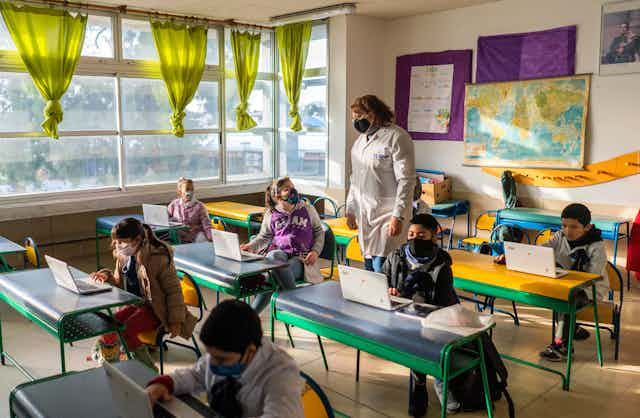How You Can Help Save Temecula Schools for Future Generations
Recognizing the Relevance of Institutions in Youngster Development and Area Development
Institutions' involvement with local communities via service-learning initiatives reinforces the bond in between households and educational institutions. This symbiotic connection emphasizes the relevance of institutions in supporting energetic citizenship and long-lasting understanding routines.
Academic Success
Academic achievement functions as a keystone of youngster development, giving the structure whereupon future learning and success are constructed. Institutions play a pivotal function in cultivating this academic development, using organized settings where kids can acquire essential knowledge and cognitive abilities. Standardized educational program guarantee that trainees gain proficiency in core subjects such as mathematics, science, and language arts, which are important for both college and expert chances.
In addition to presenting fundamental academic abilities, schools likewise grow vital thinking, analytical capacities, and intellectual inquisitiveness. These cognitive competencies are crucial for browsing complicated real-world circumstances and adjusting to the ever-evolving demands of the contemporary work environment. Educators, as facilitators of discovering, utilize diverse instructional strategies to satisfy different knowing designs, thereby making the most of specific student potential.
Additionally, scholastic success is closely linked to self-confidence and inspiration. Youngsters that experience academic accomplishments are most likely to create a positive self-concept and a lifelong enthusiasm for understanding. Institutions likewise supply various resources, such as collections and technology, which even more improve the instructional experience and prepare students for a technically innovative society.
Social Skill Development
Beyond scholastic success, the role of schools in social skill growth is important. Schools offer as a key place for youngsters to find out and exercise important social skills such as collaboration, conflict, and communication resolution. In the structured atmosphere of a classroom, students engage with peers, instructors, and other school team, supplying countless possibilities to establish these critical capacities.
Efficient social skill advancement in schools is assisted in via group tasks, joint jobs, and extracurricular programs. These interactions help trainees understand social standards, develop empathy, and promote a sense of area. For circumstances, team tasks instruct students how to collaborate in the direction of an usual objective, listen to various point of views, and navigate disputes constructively.

The farming of social abilities throughout school years lays a foundation for future personal and specialist connections. Save Temecula Schools. As pupils mature, the ability to successfully connect and collaborate comes to be increasingly important, highlighting the college's crucial function in alternative youngster growth
Exposure to Diversity
Exposure to diversity in institutions is basic to cultivating an inclusive way of thinking and broadening trainees' point of views. Schools function as a microcosm of the broader society, and running into varied societies, languages, and socioeconomic backgrounds within this environment gears up trainees with necessary skills for browsing an increasingly globalized world. This exposure motivates compassion, minimizes bias, and advertises common regard amongst peers.
Research shows that pupils who connect with peers from diverse backgrounds show much better problem-solving abilities and imagination. This understanding of diversity prepares students for future work environments that value modern proficiency - Save Temecula Schools.

Area Interaction
The benefits of diverse classrooms extend past the institution wall surfaces, cultivating a solid feeling of community involvement amongst pupils. By interacting with peers from various social, socioeconomic, and ethnic histories, pupils obtain a broader point of view and a gratitude for diversity. This exposure encourages them to become energetic citizens who are willing to contribute positively to their neighborhoods.
Colleges that stress area involvement frequently include service-learning tasks, which enable trainees to deal with real-world issues while using scholastic skills. These projects not only improve pupils' understanding of their Get More Information coursework however also instill a feeling of responsibility and compassion. Collaborations in between schools and local organizations give trainees with opportunities to get involved in neighborhood occasions, further strengthening their function as proactive area participants - Save Temecula Schools.
Additionally, adult and community involvement in institutions reinforces the bond between educational organizations and the areas they serve. Through these efforts, schools play a critical function in supporting area engagement and fostering social development.
Lifelong Learning Practices
Developing long-lasting learning habits is necessary for a kid's constant development and flexibility in an ever-changing globe. Colleges play a pivotal duty in instilling these practices by producing a setting that cultivates inquisitiveness, crucial reasoning, and a love for expertise. With extracurricular tasks and varied educational programs, instructors urge pupils to check out numerous topics, assess details seriously, and use their learning to real-world situations.

Furthermore, schools give a structured setting where kids can create self-discipline and time administration skills, both of which are crucial for continuous knowing. By highlighting the relevance of setting objectives, reviewing progress, and adjusting methods, universities prepare trainees to navigate the complexities of grown-up life, guaranteeing they remain lifelong learners and contributors to society.
Verdict
In conclusion, colleges are necessary in promoting youngster development and area development by offering settings helpful to academic success, social ability development, and direct exposure to diversity. Ultimately, institutions grow lifelong understanding practices, equipping people with the essential knowledge and abilities to contribute favorably to society.
In the structured atmosphere of a class, trainees connect with peers, teachers, and various other institution personnel, supplying various possibilities to develop these important abilities.
In essence, direct exposure to diversity within institutions not just enriches private pupils but additionally strengthens the social material of the area as a whole.
The advantages of diverse classrooms extend past the college walls, promoting a solid feeling of area involvement among trainees.Colleges that emphasize community interaction usually integrate service-learning my website projects, which allow trainees to attend to real-world troubles while using scholastic abilities. Partnerships between schools and regional organizations supply pupils with possibilities to participate in neighborhood occasions, additionally strengthening their duty as aggressive area participants.